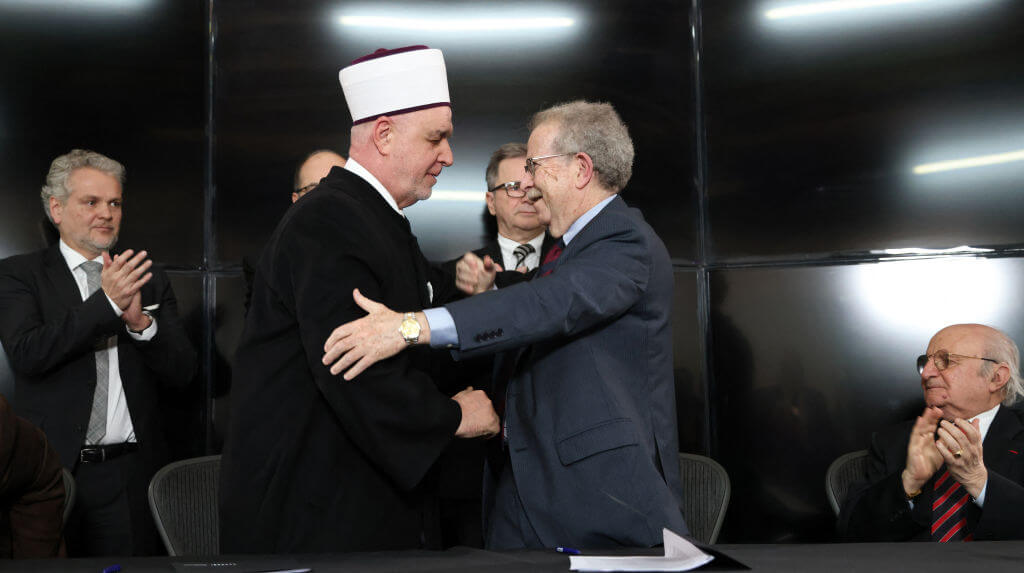Holocaust and Srebrenica survivors launch Jewish-Muslim effort to prevent genocides
Attendees said they hoped the United Nations would declare July 11 as a memorial of the Srebrenica massacre, much like it created International Holocaust Remembrance Day.

The President of the World Federation of Bergen-Belsen Associations, Menachem Rosensaft, right, and the religious leader of Bosnian Muslims, Husein Kavazovic, embrace after signing a “Jewish-Muslim Initiative for Peace” at the Srebrenica Genocide Memorial Centre in Srebrenica, on January 27, 2024, on International Holocaust Remembrance Day. Photo by Getty Images
(JTA) – To mark International Holocaust Remembrance Day this weekend, several prominent Holocaust survivors and Jewish leaders headed to the site of a different genocide — that of Bosnian Muslims in the 1990s.
They were there alongside Bosnian Muslim leaders to launch a new initiative aimed at advocating for peace and preventing future genocides.
“While we here today cannot change the past, we can and we must do all in our collective power to change the future,” Menachem Rosensaft, a professor at Cornell Law School who was born to Holocaust survivors in a displaced persons camp in Germany, said at the ceremony.
The event took place Sunday at the Srebrenica Memorial Center, a museum marking the massacre of some 8,000 Muslim men and boys were murdered by Bosnian Serb forces in the summer of 1995. Survivors of the Bosnian genocide attended the event, according to organizers.
Jacob Finci, president of the Jewish Community of Bosnia and Herzegovina, said he hoped the United Nations would declare July 11 as a remembrance day of the Srebrenica massacre, just as it eventually declared Jan. 27 to be the International Day of Remembrance for the Victims of the Holocaust.
“Our initiative today will help in that,” said Finci, who was born in a concentration camp in Italy in 1943.
The initiative comes amid intense tensions following Hamas’ Oct. 7 attack on Israel and Israel’s military response in Gaza. Those tensions have increased as Israel has fended off allegations that it is committing genocide in Gaza, where, according to Hamas data that Israel does not dispute, more than 26,000 people have been killed during the war there.
Participants in the event decried the Oct. 7 attack, in which about 1,200 Israelis were killed and more than 24o taken hostage, while also emphasizing that the toll on Palestinians in Gaza must be considered.
“We must condemn and repudiate the savagery perpetrated by Hamas against Jewish men, women, and children on Oct. 7,” Rosensaft said. “And at the same time, let me state equally clearly and equally unambiguously here today that we must not, we cannot be indifferent to the deaths and displacements endured by Palestinian civilians in Gaza,” who are “victims of a war for which they bore no responsibility whatsoever.”
Husein ef. Kavazović, grand mufti of the Islamic Community in Bosnia and Herzegovina, called the initiative “our humble contribution to building peace and better understanding.”
“Resistance to occupation cannot be a justification for committing crimes, just as calling for a fight against terrorism cannot be a justification for killing civilians and collective punishment,” Kavazović added.
Kavazović and Rosensaft signed a memorandum that cited Jewish and Muslim traditions, according to which anyone who saves a single life has saved the whole world.
“The significance of this initiative is far reaching,” said Germany’s high representative to Bosnia and Herzegovina, Сhristian Schmidt. “By building bridges between historic experiences of their communities, Muslim and Jewish religious leaders show the way towards mutual respect and peaceful coexistence.”
Schmidt said he hoped the initiative “finds followers, may I say, including the Christian community, who will spread this message all across the country and beyond.”
Also speaking at the event were Emir Suljagic, director of the Srebrenica Memorial Center, and Johann Satler, head of the European Union mission in Bosnia and Herzegovina. Mujira Subašić, president of a group representing the mothers of the man killed at Srebrenica, also participated.
This article originally appeared on JTA.org.
A message from our Publisher & CEO Rachel Fishman Feddersen

I hope you appreciated this article. Before you go, I’d like to ask you to please support the Forward’s award-winning, nonprofit journalism so that we can be prepared for whatever news 2025 brings.
At a time when other newsrooms are closing or cutting back, the Forward has removed its paywall and invested additional resources to report on the ground from Israel and around the U.S. on the impact of the war, rising antisemitism and polarized discourse.
Readers like you make it all possible. Support our work by becoming a Forward Member and connect with our journalism and your community.
— Rachel Fishman Feddersen, Publisher and CEO


























